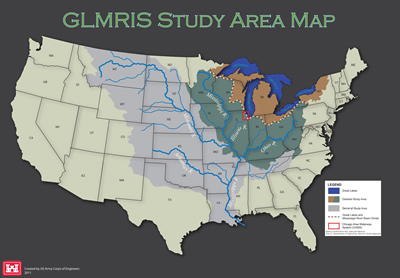The House voted 177-236 against a proposed Rep. Jim Moran (D-VA-8) amendment that would have removed language from the spending bill that effectively blocks the Army Corps from implementing an Administration guidance to clarify Clean Water Act jurisdiction. The House spending bill has been called the most expansive attempt to date to block the draft joint EPA-Army Corps guidance to refine the tests that determine the Clean Water Act's reach over isolated wetlands and other marginal waters. The House bill's language would block a controversial guidance that has been under review by the Office of Management and Budget since last year. as well as a pending rulemaking by the Army Corps and EPA that would clarify when waters are considered “navigable waters” and therefore subject to the law's regulatory requirements. A corresponding Senate bill (see below) contains no such restriction.
Key amendments relating to the Mississippi River Basin that were passed (each by a voice vote) during the hours of debate on the bill included:
- Rep. Blaine Luetkemeyer's (R-MO-3) amendment to block funding for the Missouri River Authorized Purposes Study.
- Rep. Kristi Noem's (R-SD-AL) amendment to block the establishment of a fee for surplus water from Missouri River reservoirs.
- Reps. Mike Kelly's (R-PA-3) and Sean Duffy's (R-WI-7) amendment to prohibit expanded uses of the Harbor Maintenance Trust Fund.
- Rep. Steve King's (R-IA-4) amendment to block the Army Corps from placing sediment into the Missouri River to create shallow water habitat for the endangered pallid sturgeon.
- Rep. Noem's amendment to shift $25 million to a rural water program, while reducing spending on efficiency, renewable energy and DOE administration by $15 million each.
H.R. 2609 provides funds for the study and prevention of the further spread of aquatic invasive species by funding the Great Lakes-Mississippi River Interbasin Study (GLMRIS), which the Army Corps expects to finalize at the end of this year, and it provides authority for the Army Corps to implement recommendations from GLMRIS to prevent the further spread of those aquatic invasive species, most notably Asian carp, between the two basins.
The Senate is set to consider a bill that would spend $4 billion more than is provided by the House-passed bill. The Senate's Energy and Water Development and Related Agencies Appropriations Act (S 1245) was approved by the Senate Appropriation's Committee on June 27, and passed on to the full Senate, where the measure is awaiting action.

No comments:
Post a Comment